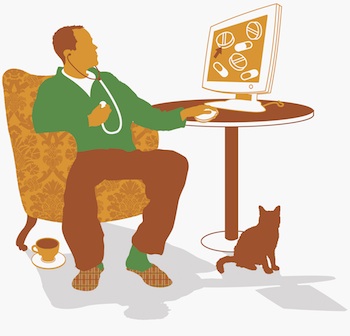A Science-ish guide to searching health info on the web
Dr. Google needn’t scare you for nothing
Share

You’re achy, slightly feverish, and that rash you’ve had on your back for a week hasn’t gone away. In a haze, you log online to peruse WebMD. After all, you’re a pretty savvy researcher, even a nerd, and you just want to find out what might be ailing you.
POW! WAM! BAM! The suggestions about the causes of your symptoms cascade over you like a tsunami of anxiety. Syphillis! Lyme disease! Dengue Fever! All are equally plausible, according to Dr. Google. Even though you know the Internet has a tendency to tell you that you have cancer when you really have a cold, your heart begins to race, your cheeks flush, and you start imagining what your friends will say at your funeral.
In many ways, the Internet has leveled the playing field between health-care providers and patients, and the questions we ask Google about our health woes are probably more honest than the ones we’d ever dare ask our doctors.
Yet searching the web for health advice can make us sick. In a new study looking at what the Internet says about sleep recommendations for infants, researchers Googled 13 search phrases about the kinds of issues worried new parents might look up. They found that less than half of the first 100 hits that appeared for each search provided quality information. (Government websites were the most accurate, followed by organizational, interest group, and news websites; retail and product review sites were the least accurate of all.) As Dr. Gerd Gigerenzer, an international crusader for better health information for patients, put it, “There are many sites that want to persuade or sell, rather than inform patients. The Internet is filled with misleading information.”
Still, other studies show that most of us turn to the Net for health advice. It’s now one of the most popular online activities. And we sometimes believe what we read, even letting those Google results inform important decisions about our health.
Now, Science-ish would never suggest forgoing online search or turning back to the days of blind deference to doctors. As Hilda Bastian, a health commentator and knowledge translator, pointed out, what we find online isn’t necessarily all bad, especially compared to other resources we might trust. Take, for example, Wikipedia: several health-related studies have revealed that crowd-sourced Wiki info can be as accurate as medical textbooks. “Making a bunch of appointments with doctors wouldn’t get you 100 per cent accurate information either,” Bastian wrote in an email. “It’s all about being evidence-based, which is extremely skill- and resource-intensive, whether it’s a website, health-care practitioner, guideline or anything else.”
Even without a degree in evidence-based medicine, there are alternatives to panic-stricken run-ins with Dr. Google. Here’s a Science-ish compendium of useful, accurate health sites:
Cochrane Consumer Network
Find reader-friendly interpretations of patient-important Cochrane systematic reviews. (Systematic reviews are key resources because they summarize all the best available clinical research on a health-care topic, and summaries of evidence are generally less prone to bias and can tell us more than single studies. Read more about why here and here.)
Health-evidence.ca
This site gathers sound reviews about health, published from 1985 to the present, and appraises their quality on a 10-point scale.
Mayo Clinic
With guides to wellness and diseases, this is a good starting point for easily accessible information about your health.
Medline Plus
Produced by the National Library of Medicine in the U.S., this is an easy-to-navigate resource for your health questions, with information about the latest medical research and treatments.
NHS Choices
Run by the National Health Service in the U.K., this site is a source of accessible advice, including explanatory videos, about every health question you can imagine
Patient Decision Aids
A project of the Ottawa Research Institute, this site has tools that help people balance evidence, treatment options, and values in making their health-care decisions. (You can browse through other decision-making resources here.)
PubMed Health
This site specializes in reviews of “clinical effectiveness research”—or studies that answer the question of “What works?” in medicine. More easy-to-read summaries and consumer information here, too.
Trip Database
Though it’s geared toward health-care professionals, this clinical search tool can be patient-friendly. Science-ish likes it because it has high-quality health evidence that is regularly updated and conveniently organized by type.
U.S. Preventive Services Task Force
This is the online home of the independent evidence-based medicine gurus who regularly overturn conventional wisdom about health. (Ie. routine prostate-cancer screening may do more harm than good after all.) The section geared toward consumers and patients is a trove of useful information.
Good luck!
Science-ish is a joint project of Maclean’s, the Medical Post and the McMaster Health Forum. Julia Belluz is the associate editor at the Medical Post. Got a tip? Seen something that’s Science-ish? Message her at [email protected] or on Twitter @juliaoftoronto